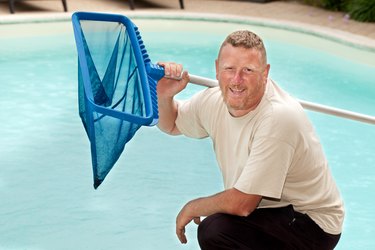
Many swimming pool filters use sand to trap unwanted debris and keep it out of the pool water. Pool sand is a very effective filter, but it's also a bit pricey. Because play sand, also known as sandbox sand, is less expensive than pool sand, pool owners are often tempted to try using it in the pool filter. Play sand and pool sand are not the same, however, and are not interchangeable. Pool sand is much finer and smaller than play sand, and the two types of sand are composed of different materials.
Why Size Matters
Video of the Day
The particulates that compose pool filter sand are a minuscule .45 to .55 millimeters in size. As your pool water flows down through this sand, debris and particulates as small as 20 to 100 microns in size get caught in between the tiny sand particles and filtered out of the water. At a size of up to 2 millimeters across, sandbox and play sand particles are much coarser and larger than pool sand. When used in a swimming pool filter, these larger sand particles trap much less dirt and debris. Any dirt that isn't trapped simply flows back into your pool. If you use sandbox sand in your pool filter, you're paying to run a pool filter that isn't actually keeping your pool clean.
Video of the Day
Sand Components
When water washes over rocks, it slowly breaks them down into the particulates that make sand. As a result, sand contains quartz, feldspar and other crushed rock. It also contains silica. Silica and silica dust are known carcinogens and are undesirable in play sand. Children who inhale silica dust while playing in a sandbox could develop an irreversible and potentially fatal disease known as silicosis. To keep children safe, silica is filtered out of play sand. Silica is desirable in pool sand, however, as it attracts and holds particulates in water. The high amount of silica in pool sand makes it extremely effective as a filter. If you use play sand rather than pool sand, you're missing out on silica's excellent cleaning power.
The Bottom Line
It's a bad idea to use anything in your pool filter except sand specifically processed and sold for that purpose. Play sand simply won't keep your pool as clean as it should be. Beach sand and play sand may introduce contaminants and insects into your pool, as well, and are much more likely to travel out of the filter and into the pool itself. If you use the proper sand, you will only need to replace your filter sand once every 5 to 15 years, depending on your water conditions. Because it holds less debris, play sand needs to be changed far more frequently. Though play sand is cheaper than pool sand upfront, you may actually spend more on play sand over the long term due to the frequent need for sand replacement.